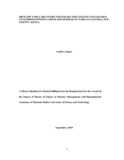DROUGHT EARLY RECOVERY STRATEGIES INFLUENCING SUSTAINABLE LIVELIHOOD OPTIONS AMONG HOUSEHOLDS IN TURKANA CENTRAL SUB COUNTY, KENYA
Abstract
Drought has significant impacts in climate sensitive sectors in ASAL areas of Kenya. Despite the existence of drought early recovery strategies, Turkana central suffers from extreme drought conditions with negative implications on livelihood security. This study sought to examine the drought early recovery strategies influencing Sustainable livelihood options among households in Turkana Central Sub County. The study was guided by three specific objectives including to: determine the early recovery strategies towards drought occurrence among households; examine the effects of drought on livelihood options among households and to evaluate the effectiveness of early recovery strategies in use against drought. The study used structured household questionnaires, participant observation checklists, key informant interview guides and focus group discussions to collect both quantitative and qualitative primary data. Secondary data included content reviews obtained from publications, journals, and internet access. A sample size of 384 households was determined using fisher’s formula. The study utilised proportionate, quota sampling and purposive sampling. All the quantitative data collected was analysed using Excel and SPSS version 20 to generate descriptive statistics. The study was anchored on Pressure and Release Model as well as the Watts and Bohle vulnerability Model. The drought early recovery strategies identified in this study included crop farming found to be the main livelihood activity relied on by households at 58% with 26% relying on livestock keeping, 14% on social support networks while other livelihood diversification activities at 4% respectively. The results indicated that drought has had a huge negative impact on the lives of pastoralists. Livestock mortality accounted for 51.5% of the effects of drought on pastoral households while shortage of food accounted for 25.5%. Water shortage and poor nutritional diets accounted for 20% and 3% of the effects of drought on livelihoods respectively. The study also revealed further that among the drought early recovery strategies used in the area, crop farming and provision of food for school going children were the most effective early recovery strategies as they addressed long-term needs. The study concluded that drought remains a potent threat to the fragile local and climate sensitive economies such as livestock keeping and crop farming in Turkana central sub county. The findings of this study will therefore deepen understanding and knowledge about pastoralists ’adaptation and coping responses to drought stresses, possible intervention measures as well as inform policy makers on policy designed to reverse the decline in pastoral production systems. Furthermore, the findings will also seek to inform the formulation and establishment of an early recovery strategy and policies for ASAL areas using Turkana County as a reference case study. It will also further contribute to the scientific knowledge base which can be used for academic purposes globally.

